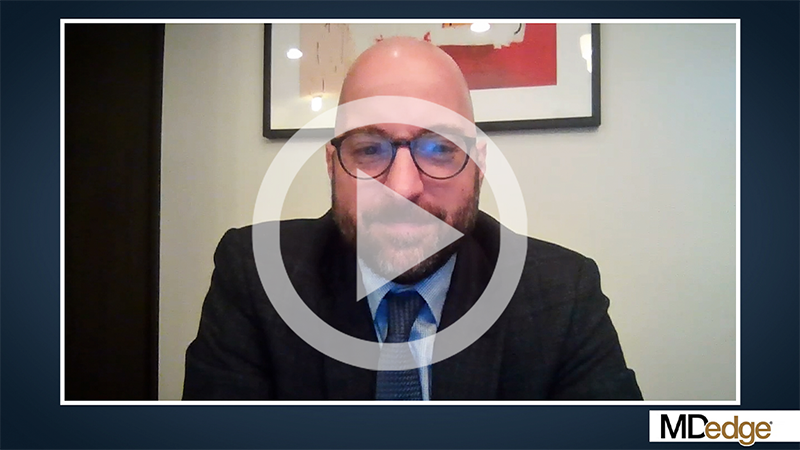User login
Highlights in diffuse large B-cell lymphoma (DLBCL) from the 2023 American Society of Hematology (ASH) Annual Meeting and Exposition that are particularly relevant to Veterans Health Administration (VHA) patients are reported by Dr Nicholas Burwick of Puget Sound VA Health Care System.
Dr Burwick begins with a large VHA study examining racial disparities in DLBCL outcomes among veterans. Importantly, overall survival was not significantly different across racial groups.
He next covers two studies in the DLBCL frontline setting. The first examines the efficacy of standard-dose R-CHOP; reduced-intensity R-CHOP; and an anthracycline alternative regimen among older patients. Standard-dose R-CHOP yielded superior results in patients aged 70- to 79-years but not for those older than 80 years, a group that merits further study.
The second frontline study focused on the chemotherapy-free regimen mosunetuzumab plus the antibody-drug conjugate polatuzumab vedotin (pola) in patients who are older and unfit for chemotherapy. The combination showed good preliminary efficacy.
Turning to relapsed/refractory patients, Dr Burwick discusses a real-world study examining response rates to tafasitamab in White vs Black/African American patients and non-Hispanic vs Hispanic patients. Differences between the two groups proved minimal.
Finally, he discusses a study of the bispecific antibody glofitamab and pola in heavily pretreated patients that showed promising results in this population.
--
Nicholas R. Burwick, MD, Associate Professor, Department of Medicine, Division of Hematology, University of Washington; Staff Physician, Department of Medicine, Division of Hematology, Puget Sound VA Health Care System, Seattle, Washington
Nicholas R. Burwick, MD, has disclosed no relevant financial relationships
Highlights in diffuse large B-cell lymphoma (DLBCL) from the 2023 American Society of Hematology (ASH) Annual Meeting and Exposition that are particularly relevant to Veterans Health Administration (VHA) patients are reported by Dr Nicholas Burwick of Puget Sound VA Health Care System.
Dr Burwick begins with a large VHA study examining racial disparities in DLBCL outcomes among veterans. Importantly, overall survival was not significantly different across racial groups.
He next covers two studies in the DLBCL frontline setting. The first examines the efficacy of standard-dose R-CHOP; reduced-intensity R-CHOP; and an anthracycline alternative regimen among older patients. Standard-dose R-CHOP yielded superior results in patients aged 70- to 79-years but not for those older than 80 years, a group that merits further study.
The second frontline study focused on the chemotherapy-free regimen mosunetuzumab plus the antibody-drug conjugate polatuzumab vedotin (pola) in patients who are older and unfit for chemotherapy. The combination showed good preliminary efficacy.
Turning to relapsed/refractory patients, Dr Burwick discusses a real-world study examining response rates to tafasitamab in White vs Black/African American patients and non-Hispanic vs Hispanic patients. Differences between the two groups proved minimal.
Finally, he discusses a study of the bispecific antibody glofitamab and pola in heavily pretreated patients that showed promising results in this population.
--
Nicholas R. Burwick, MD, Associate Professor, Department of Medicine, Division of Hematology, University of Washington; Staff Physician, Department of Medicine, Division of Hematology, Puget Sound VA Health Care System, Seattle, Washington
Nicholas R. Burwick, MD, has disclosed no relevant financial relationships
Highlights in diffuse large B-cell lymphoma (DLBCL) from the 2023 American Society of Hematology (ASH) Annual Meeting and Exposition that are particularly relevant to Veterans Health Administration (VHA) patients are reported by Dr Nicholas Burwick of Puget Sound VA Health Care System.
Dr Burwick begins with a large VHA study examining racial disparities in DLBCL outcomes among veterans. Importantly, overall survival was not significantly different across racial groups.
He next covers two studies in the DLBCL frontline setting. The first examines the efficacy of standard-dose R-CHOP; reduced-intensity R-CHOP; and an anthracycline alternative regimen among older patients. Standard-dose R-CHOP yielded superior results in patients aged 70- to 79-years but not for those older than 80 years, a group that merits further study.
The second frontline study focused on the chemotherapy-free regimen mosunetuzumab plus the antibody-drug conjugate polatuzumab vedotin (pola) in patients who are older and unfit for chemotherapy. The combination showed good preliminary efficacy.
Turning to relapsed/refractory patients, Dr Burwick discusses a real-world study examining response rates to tafasitamab in White vs Black/African American patients and non-Hispanic vs Hispanic patients. Differences between the two groups proved minimal.
Finally, he discusses a study of the bispecific antibody glofitamab and pola in heavily pretreated patients that showed promising results in this population.
--
Nicholas R. Burwick, MD, Associate Professor, Department of Medicine, Division of Hematology, University of Washington; Staff Physician, Department of Medicine, Division of Hematology, Puget Sound VA Health Care System, Seattle, Washington
Nicholas R. Burwick, MD, has disclosed no relevant financial relationships
